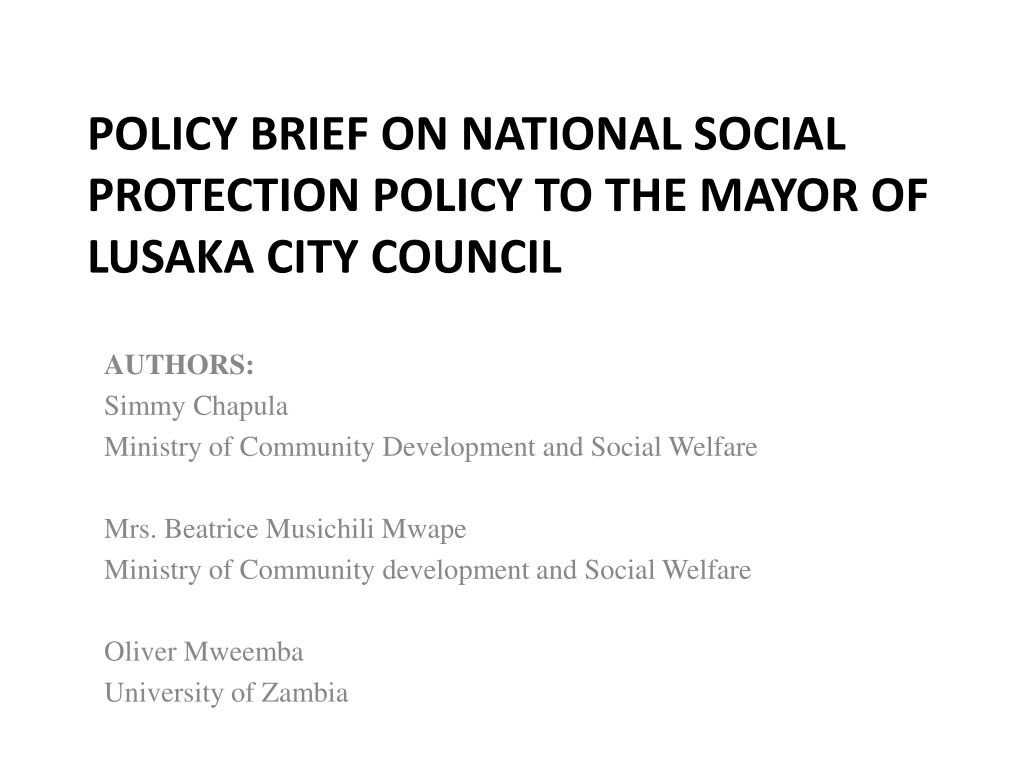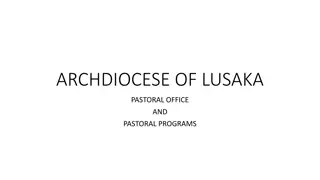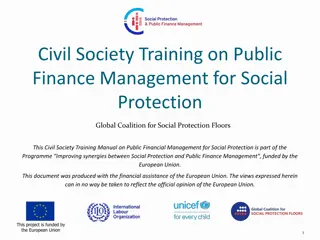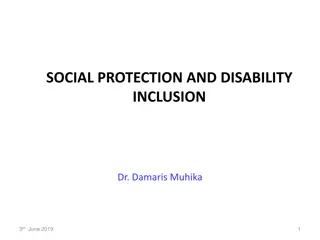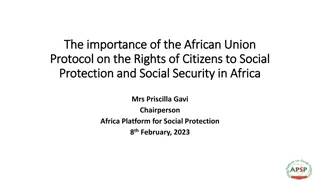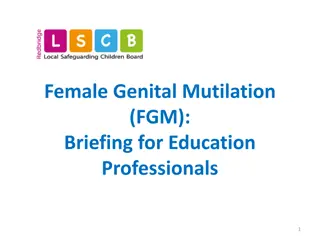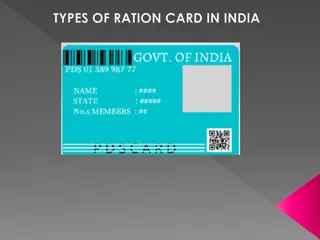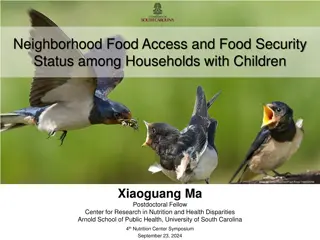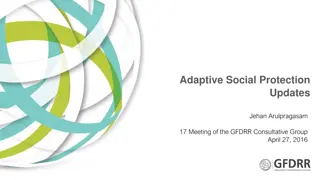Enhancing Social Protection Policy for Female-Headed Households in Lusaka
Persistent poverty among female-headed households in Lusaka necessitates a robust social protection policy aiming to alleviate poverty, improve access to basic services, and enhance overall well-being. The implementation of social cash transfer programs has shown promising results in uplifting vulnerable households by boosting education, health, nutrition, and economic productivity. Continued evaluation is essential to measure the full impact and effectiveness of these initiatives.
Download Presentation

Please find below an Image/Link to download the presentation.
The content on the website is provided AS IS for your information and personal use only. It may not be sold, licensed, or shared on other websites without obtaining consent from the author. Download presentation by click this link. If you encounter any issues during the download, it is possible that the publisher has removed the file from their server.
E N D
Presentation Transcript
POLICY BRIEF ON NATIONAL SOCIAL PROTECTION POLICY TO THE MAYOR OF LUSAKA CITY COUNCIL AUTHORS: Simmy Chapula Ministry of Community Development and Social Welfare Mrs. Beatrice Musichili Mwape Ministry of Community development and Social Welfare Oliver Mweemba University of Zambia
Context and importance In Zambia, Poverty and vulnerability has continued to persist recording a high rate of poverty among female headed households which stands at 46% in Lusaka (1.2 million) In Lusaka City, one in every ten household is poor and vulnerable. Mainly due to rural urban migration This leads to limited access to basic social services such as health, education, water and sanitation, nutrition and housing
Argument for current approach Social cash transfer programs are important in moving the poor and vulnerable female headed households from poverty to increased capacity of investment in productive activities. This will lead to improved nutrition, education, health and well-being of the households. Positive impact in reducing high levels of stunting, increased school enrollment, improved health outcomes and enhanced economic productivity of the households.
Impact of Cash Transfers First Evaluation show that : Education: enrollment rate went up by 3%. Nutrition: % of HH not satiated after one meal went down from 56.6% to 35.2%; food intake is more varied Health: incidence of illnesses decreased from 43% to 35%. Livelihood: number of HH making investments quadrupled to 50% and average amount invested doubled; 71% of all HH stated to have invested part of the cash transfer; asset ownership increased from 8.5% to 42%) Future perspective: more households are hopeful (increase from 37% to 49%) and have more plans (increase from 50% to 73%) Community: incidence and frequency of begging reduced However more rigid and strictly controlled impact evaluation is underway and will produce more conclusive evidence on impacts of the scheme
Purpose of the Policy The social Cash Transfer will protect and promote the livelihoods and welfare of female-headed households from high levels of poverty The policy will also improve the health and well- being of the orphans and vulnerable children in female-headed households It will break the intergenerational transmission of poverty, promote human rights and reduce social and economic inequalities.
Key recommendations for action Allocate enough resources on social cash transfer targeting women taking care of orphans and vulnerable children. Provide regular and predictable cash transfers to the female headed households Establish a coordinating unit in order to avoid duplication, overlaps in the disbursement of cash transfers Promote collaborative and multi-sectoral partnership among key stakeholders and strengthening linkage with other partners. Enhance good governance and accountability of resources to derive maximum benefits. Develop a management information system to monitor the impact of social cash transfer s on the health, education and nutrition of the households Conduct awareness and sensitization programs Conduct capacity building programs for targeted groups
Key stakeholders Stakeholder Negotiation MoF Budgetary Allocation MoH Health outcomes and nutritional status MCDSW Implementers of the Social Cash Transfer (SCTs) programs MLGH Housing, Water and Sanitation MoGE Bursary, primary and secondary education MoJ Legal framework MoG Promotion of gender equity Media Advocacy, sensitization and awareness of the programs CSO/NGO/FBO TA, partnership implementation of programs Cooperating Partners Additional resources (financial, material, human)
Approaches to Intersectoral arguments By collaborating with the various sectors, there will be an added value to the social cash transfer program in terms of its impact on health, education, nutrition, and economic productivity of the female headed households Improved health and equity contribute to wider public gain
Evidence and general strategies Collect and analyze data in all female headed households taking care of orphans and vulnerable children Develop a selection criteria Map-out the pay points in the city and identify the pay point managers Conduct training of the community welfare assistant committees Capacity Building of Social Welfare Officers
Strengths and weakness for policy Strengths Improved livelihoods Improved health outcomes Lack of graduation Weakness Dependency syndrome Improved school enrolment Improved nutrition Political Will Long-term investment (no immediate benefits)
Final decision at National Policy Adopt the policy aimed at providing social cash transfers to the female headed households Strengthen partnership mechanism Improve household productivity Monitor impact on health and equity Contribute towards the achievement of the SDGs Better Coordination of the Cash Transfer Prgramme. THANK YOU
